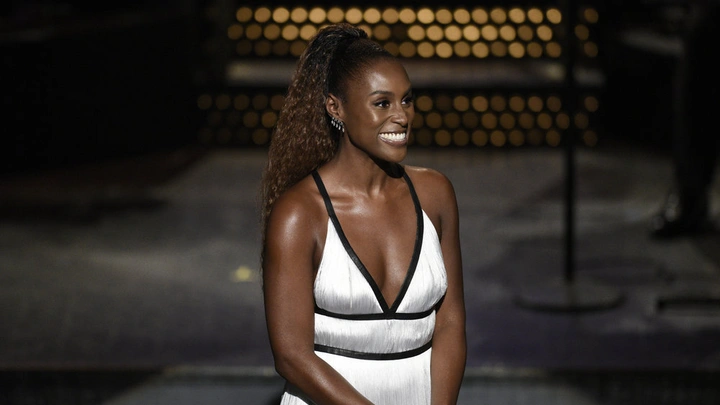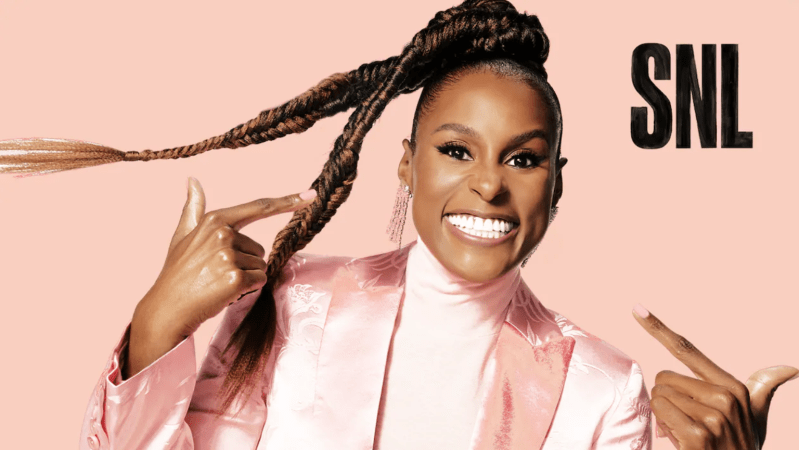On Oct. 17, Issa Rae ’07 hosted Episode 3 of Season 46 of “Saturday Night Live” with musical guest Justin Bieber. The episode addresses important issues surrounding race and the presidential election in the United States.
NBC’s “Saturday Night Live” is a sketch-comedy show featuring celebrities and musicians. Walking down the stairs of the SNL set is viewed as a milestone in one’s career.
During election seasons, the show is known for making parodies of political events. The episode cold-opened with “Dueling Town Halls,” where comedian Jim Carrey impersonates Bill Clinton and Alec Baldwin carries out his notable impression of Donald Trump, during the candidates’ respective 2020 Presidential Town Halls. SNL alum Maya Rudolph also made a guest appearance as Vice President-elect Kamala Harris.

The episode then transitions to Rae walking down the iconic steps of the SNL set to deliver her monologue. As she opens, she mentions that she is excited to be hosting because she is “the first Black woman to host SNL,” to which many audience members applauded. This is not true, however, as she quickly clarified and expressed shock toward the applause her comment received. The first Black woman to host was Cicely Tyson in 1979, four years after comedian Richard Pryor became the first Black person to host the show. Here, Rae takes a dig at Hollywood diversity and is not afraid to tackle race through satire as demonstrated through the rest of the show.
In her time at Stanford, Rae tackled race in a similar way through “Dorm Diaries,” which she created and directed. The series provides a “satirical look at Black life on Stanford’s campus.” Rather than shed light on Black life as “another” life like some other works do, Rae centralized the Black experience, much like how the SNL episode focuses on the Black identity in the contemporary United States.
In one of the sketches, titled “First Date Exes,” Rae’s character goes on a first date in an outdoor dining experience during COVID-19. Her exes intrude on her date and reveal more about her. The sketch also touches on the sexual harassment women face as the exes of Rae’s character point out her cleavage.
The sketch that stood out to me the most was “5-hour Empathy,” which was delivered in a commercial format, something SNL does pretty well. The sketch opens with a white man concerned about the current “civil unrest” and wanting to help, although he claims he can’t understand what some people in the U.S. are going through. The advertised product “5-hour Empathy” is akin to 5-hour Energy; however, this formula provides five hours of complete and intimate understanding of systemic oppression and racism.
After learning this, the man puts the bottle down and resumes his task. The commercial pushes him to drink the bottle; however, the man only pretends to drink it. I found this as a way to illustrate “talking the talk” but not “walking the walk.” In other words, some claim to support certain causes, in this case the fight for social justice, but are not willing to do the work required.
Throughout the sketch, the man avoids drinking the bottle because he fears feeling the pain felt by those being oppressed, which the commercial calls him out for. His wife walks in and asks him if “too many NFL players are kneeling again.” Colin Kaepernick gained attention for kneeling during the national anthem in 2016 in a peaceful protest of police brutality in the United States. Kaepernick was later fired by the San Francisco 49ers. The man in the sketch never drinks the bottle and thus fails to gain empathy.
Later in the show, “Your Voice Chicago” highlights the challenges presented by political party affiliations and racism, and also raises awareness around failed representation and the growing gap between the rich and poor in the United States. Rae’s character, Jamele Demmings, is the lead counsel for Chicago’s NAACP.
Jamele claims that she will vote for everybody who is Black in an upcoming local election. Later in the sketch, her character is asked who she would vote for District 10 representative. One of the candidates is a billionaire. As Jamele answers, she assumes that the billionaire is Scott Trebor, a white man, and asks, “A billionaire? Now see, how can anyone who’s so rich know anything about us? Okay? Money corrupts the whole system.” This highlights the failed representation in government through corporate lobbying and the stark difference between the economic classes of constituents and their representatives.
To her surprise, the candidate Rashad Carter, who is Black, is the billionaire. She shifts her answer to voting for Rashad Carter because being a billionaire who owns a software company is “so inspiring,” despite previously questioning being represented by a billionaire. This further illustrates the complexities involved in politics as she tries to remain in support of the Black candidate. She adds that she has to go with Carter thinking he is the Democrat; however, she learns that Trebor is the actual Democrat in this race and Carter is a Libertarian, which shows how political parties create challenges when voting and in the larger scope of politics.
Through the rest of the sketch, while the other guest on the show considers factors besides race when deciding who to vote for, Jamele works to find reasons to vote for the Black candidates across different districts. The sketch ends with the host mentioning the presidential race between Trump, Biden and Kanye West to which Jamele replies, “Kanye? F him.” I interpreted this in three ways: Jamele genuinely does not want Kanye for president and breaks her commitment to vote for anyone who is Black; Jamele “learns” what to consider when voting through her previous discussion of candidates; and a message implying to not vote for Kanye in the 2020 election.
Throughout this episode, Rae tackled important issues in the United States through satire. The sketches created discourse around these issues in a relatable way. The satire made the sketches funny; Rae’s take on these issues provides a meaningful and accessible way of thinking about them.
Contact Rosana Maris Arias at rosmar18 ‘at’ stanford.edu.
